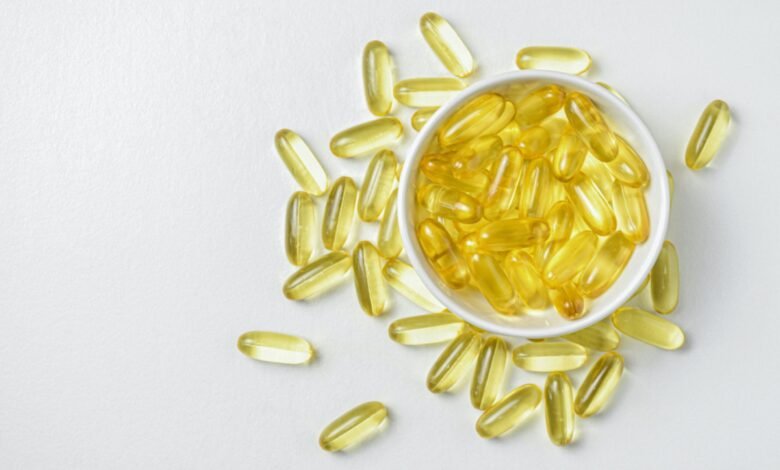
Table of contents
Vitamin E and its importance :
Vitamin E is a type of oily vitamin (lipid-soluble vitamin) also known as “tocopherol.” It is considered a potent antioxidant that helps protect the body from damage caused by free radicals. Free radicals are unstable molecules that can cause harm to cells and tissues in the body and are considered a factor in the aging process and some diseases.
Vitamin E contains several diverse compounds such as tocotrienols, tocopherols, and tocotrienols, with the most important forms being alpha-tocopherol, which is the most biologically active and primarily absorbed by the body.
Vitamin E is important for skin and mucous membrane health and contributes to maintaining eye health, blood vessels, and the immune system. Adequate amounts of vitamin E may also help maintain hormonal balance and overcome some fertility problems.
It is advisable to consume an appropriate amount of vitamin E daily as part of a balanced diet. If relying on vitamin E-containing supplements, it is preferable to consult a doctor or nutrition expert to determine the appropriate dosage and avoid excessive doses that may lead to side effects.
Sources of Vitamin E:
Vitamin E can be found in various food sources. Here is a list of some vitamin E-rich foods:
- Plant Oils: Wheat germ oil, sunflower oil, soybean oil, cottonseed oil, canola oil, and others.
- Nuts: Almonds, pistachios, walnuts, cashews, hazelnuts, apricot kernels, peanuts, and others.
- Seeds: Sunflower seeds, cotton seeds, flaxseeds, quinoa seeds, and others.
- Green Leafy Vegetables: Spinach, kale, green peas, collard greens, broccoli, and others.
- Whole Grains: Whole wheat, oats, brown rice, and whole corn.
- Other Foods: Avocado, carrots, tomatoes, cantaloupe, and mango.
It is essential to ensure a diverse intake of these food sources to guarantee the body receives a sufficient amount of vitamin E. It may be preferable to consume these sources naturally within a balanced diet unless there is a specific medical reason to rely on dietary supplements.
Symptoms of Vitamin E Deficiency:
Vitamin E deficiency rarely occurs in humans independently and isolatedly because it is present in sufficient amounts in many foods. However, if a vitamin E deficiency occurs, some symptoms and signs may manifest, including the following:
- Weak Immune System: Vitamin E deficiency may lead to a weakened immune system and increased susceptibility to infections.
- Skin Problems: Cracking and dryness of the skin may appear.
- Eye Issues: Deterioration of night vision may occur, and the eyes may become more susceptible to diseases.
- Muscle Weakness: Vitamin E deficiency can result in muscle weakness and reduced ability to move and walk.
- Nerve Problems: Some neurological symptoms may surface, such as tingling, numbness in the extremities, and loss of balance.
- Circulatory System Disorders: Vitamin E deficiency may lead to circulatory system disorders and an increased heart rate.
If you suspect a vitamin E deficiency or experience similar symptoms, it is essential to consult a doctor. The doctor can diagnose your condition and determine whether there is a need to enhance vitamin E intake through natural nutrition or dietary supplements.
Vitamin E for Pregnancy:
Vitamin E is a safe and essential vitamin for pregnant women, similar to many other vitamins. It supports the health of both the mother and the fetus, playing a vital role in maintaining healthy skin and tissues and acting as an antioxidant that protects cells from damage.
Here are some potential benefits of vitamin E for pregnant women:
- Cell and Tissue Protection: Vitamin E contributes to protecting cells from damage caused by free radicals, thereby improving tissue health throughout the body.
- Skin Health Support: Vitamin E can help maintain skin health and reduce irritation and dryness that may occur due to hormonal changes during pregnancy.
- Role in Fetal Development: Vitamin E may play a role in supporting fetal growth, contributing to the development of the nervous system, eyes, skin, and muscles.
- Immune System Support: Vitamin E aids in supporting the immune system of the mother, reducing the risk of infections.
- Reducing Arterial Issues: Some evidence suggests that vitamin E may lower the likelihood of certain arterial problems that may affect the mother during pregnancy.
The American College of Obstetricians and Gynecologists recommends that:
pregnant women get between 15 to 19 milligrams of vitamin E daily from food sources. Vitamin E can be obtained by consuming foods rich in it as part of a balanced diet. These foods include plant oils, nuts, seeds, and green leafy vegetables.
Although vitamin E is safe at dietary levels, it is essential to consult a doctor before taking any dietary supplements:
including vitamin E, during pregnancy, to ensure their suitability and the appropriate dosage.
Pharmaceutical Forms of Vitamin E:
Here are some common pharmaceutical forms of vitamin E:
- Oil Capsules: These capsules contain pure vitamin E oil and can take orally.
- Softgel Capsules: These capsules contain vitamin E oil and are easy to swallow.
- Chewable Tablets: These tablets contain vitamin E powder and are used to provide the body with the necessary vitamin.
- Cosmetic Products: Some skincare and haircare products contain vitamin E due to its benefits for skin health and moisturization.
- Sunscreen Products: Some sunscreen creams contain vitamin E to protect the skin from damage caused by ultraviolet rays.
Health authorities recommend obtaining vitamin E from natural food sources such as plant oils, nuts, seeds, and green leafy vegetables. It is important to consult a doctor before taking any dietary supplements why? to ensure the appropriate dosage and safety, especially if you have any specific medical conditions or are taking other medications.




